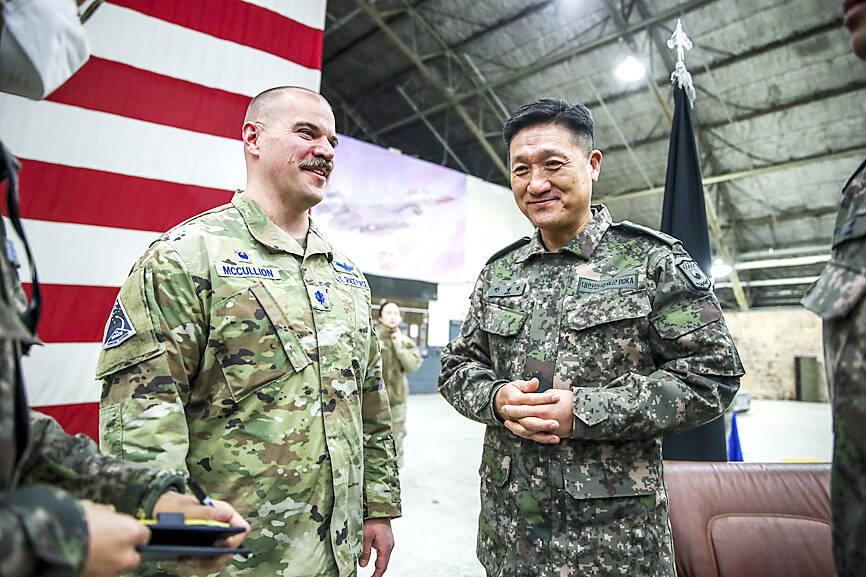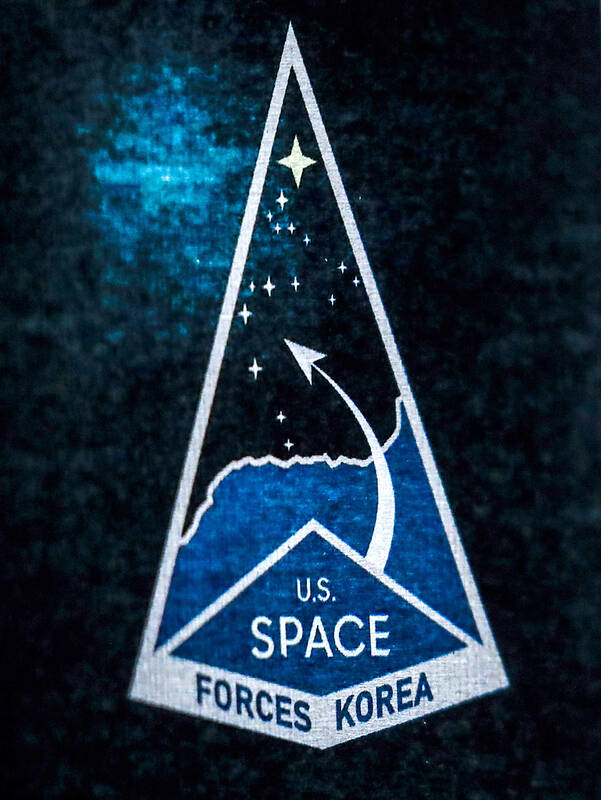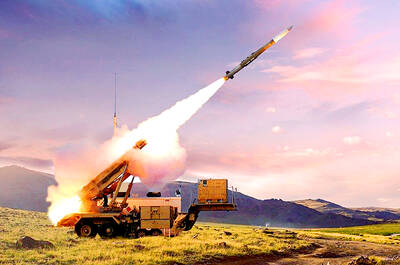US Forces Korea yesterday launched a new space force unit, as Washington and Seoul ramp up efforts to better counter North Korea’s evolving nuclear and missile threats.
US Space Forces Korea is the second overseas space component of the US Space Force, and is tasked with monitoring, detecting and tracking incoming missiles, as well as bolstering the US military’s overall space capability.
It is to be led by Lieutenant Colonel Joshua McCullion, the US Forces Korea said.

Photo: EPA-EFE
General Paul LaCamera, commander of the sub-unified command of the US Indo-Pacific Command, said the unit would enhance the US’ ability to ensure peace and security on the Korean Peninsula and in Northeast Asia.
“The US military is faster, better connected, more informed, precise and legal because of space,” LaCamera told a ceremony at Osan Air Base in Pyeongtaek, South Korea.
Seoul and Washington are seeking to boost security cooperation to deter North Korea, which earlier this year tested intercontinental ballistic missiles capable of reaching the US mainland.

Photo: EPA-EFE
The South Korean Air Force this month also set up its own space unit, saying it would bolster its space power and operation capability together with the US Space Force.
US officials have expressed concerns over rising security activity in space by major rivals, including China’s development of hypersonic weapons and Russia’s test of anti-satellite technology last year.
Beijing has warned Seoul against joining a US-led global missile shield, and criticized that THAAD US missile defense systems are installed in South Korea.
The South Korean Ministry of National Defense said the creation of the US space component had nothing to do with South Korea’s participation in existing missile defense programs.
About 28,500 US troops are stationed in South Korea under a mutual defense treaty forged after the 1950-1953 Korean War ended in an armistice, not a peace treaty.
The US Indo-Pacific Command and Central Command set up their space units last month in Hawaii and Florida respectively.

OPTIMISTIC: The DGBAS sharply upgraded its GDP growth estimate from 3.54 percent to 7.71 percent after the Taiwan-US trade agreement signing and given AI optimism The US imported more from Taiwan than China for the first time in decades, as US President Donald Trump’s tariffs reshape trade flows while a global boom in artificial intelligence (AI) fuels demand for tech products. US purchases of goods from China plunged almost 44 percent in December last year from 2024 to US$21.1 billion, US Department of Commerce data showed on Thursday. By contrast, shipments from Taiwan more than doubled during the same period to US$24.7 billion. The soaring Taiwanese shipments to the US reflect the huge expansion in supplies of chips and servers for AI companies, which has completely changed

NON-NEGOTIABLE: The US president’s action ran counter to one of the US’ ‘six assurances’ on not consulting China about arms sales to Taiwan, US lawmakers said US President Donald Trump’s admission that he is discussing arms sales to Taiwan with Chinese President Xi Jinping (習近平) is “alarming and a blatant violation of US policy and the six assurances,” US Representative Ro Khanna said on Tuesday. Trump on Monday said he would decide soon on whether to send more weapons to Taiwan, after Xi warned him not to do so. “I’m talking to him about it. We had a good conversation, and we’ll make a determination pretty soon,” Trump told reporters aboard Air Force One when asked about warnings raised by Beijing during a phone call with Xi over

US and Chinese fighter jets briefly faced off above waters near the Korean Peninsula this week, Yonhap News agency reported, marking a rare confrontation in that area between the two superpowers. About 10 US fighter jets on Wednesday departed an airbase in Pyeongtaek, South Korea, for drills above international waters off South Korea’s western coast, the news outlet cited unidentified military sources as saying. While the US planes did not enter China’s air defense identification zone, Beijing scrambled planes as they neared that region, the report said. “The Chinese People’s Liberation Army organized naval and air forces to monitor and effectively respond

VACILLATING? Some US officials are concerned that Trump’s April visit to Beijing might be affected if Washington pushes through additional weapons sales to Taiwan A major US arms sales package for Taiwan is in limbo following pressure from Chinese President Xi Jinping (習近平) and concerns among some US officials that greenlighting the deal would derail US President Donald Trump’s upcoming visit to Bejing, the Wall Street Journal (WSJ) reported on Wednesday. Trump on Monday said that he would decide soon on whether to send more weapons to Taiwan, after Xi warned him not to do so. “I’m talking to him about it. We had a good conversation, and we’ll make a determination pretty soon,” Trump told reporters aboard Air Force One when asked about warnings raised